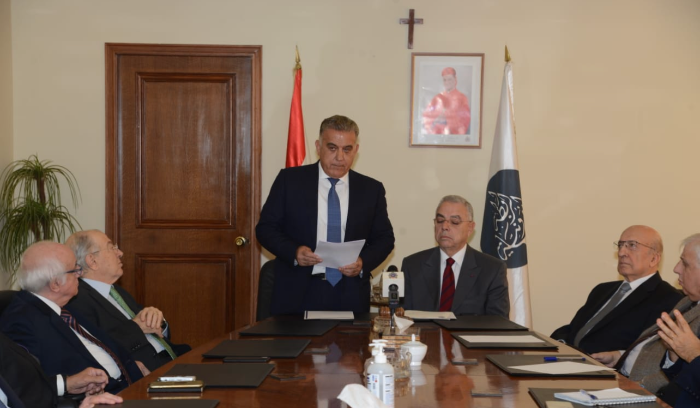
General Security Chief Abbas Ibrahim during his meeting with the Maronite League. (Credit: NNA)
BEIRUT — General Security chief Abbas Ibrahim said Monday during a meeting with the Maronite League that Lebanon will not be secure unless "political stability and economic stability are ensured in the country," warning once more of the growing insecurity that the ongoing political crisis could stir, the state-run National News Agency reported.
According to the NNA, Ibrahim added that “the cause of political instability is due to the widespread disputes within Lebanon, and the mutual backbiting between political peers.”
The report went on to say that Ibrahim called for the election of a new Lebanese president, noting that if there is “no president of the republic, things will change for the worse, and that the security sector is one of the most affected sectors and … that the social situation will explode sooner or later."
Lebanon continues to face a double executive-level power vacuum. Lebanon has been without a president since former President Michel Aoun's term in office ended on Oct. 31, while Najib Mikati's cabinet is serving in a caretaker capacity following failed attempts at cabinet formation prior to Aoun's departure. It is not the first time, since the onset of this executive vacuum, that Ibrahim has warned of instability if the political crisis drags on.
On the topic of Syrian refugees in Lebanon, the NNA reported that Ibrahim denied that any of the displaced Syrians returning to their country had been imprisoned or subjected to harassment. He claimed that the United Nations High Commissioner for Refugees (UNHCR) had verified this information, although UNHCR has not released a statement on the matter.
Lebanese authorities have long pushed for Syrian refugees to return to their home country, and have made several repatriation efforts, which they describe as voluntary, but human rights groups have branded the returns as forced.
"In enthusiastically facilitating these returns, the Lebanese authorities are knowingly putting Syrian refugees at risk of suffering from heinous abuse," said human rights watchdog Amnesty International in October.
However, according to the NNA, Ibrahim on Monday accused social media platforms and websites of spreading false news “with the aim of intimidating Syrians from returning.”
"Lebanon is working to find a solution regarding the births of the displaced Syrians, fearing that they will turn into 'undocumented persons' and obtain Lebanese nationality in the future, and the minister of social affairs, Hector Hajjar, is handling this file with the Syrian Embassy in Lebanon," the NNA cited Ibrahim as saying at the meeting with the Maronite League said.
Authorities say Lebanon hosts around 2 million Syrian refugees. Nearly 830,000 of these refugees are registered with the UN.
Syrian refugees in Lebanon have reported discriminatory practices including “arrests at checkpoints … raids on camps, adoption of stricter movement rules, and tensions between host and refugee communities," the Access Center for Human Rights, a refugee watchdog group in Lebanon, told L'Orient Today in August.